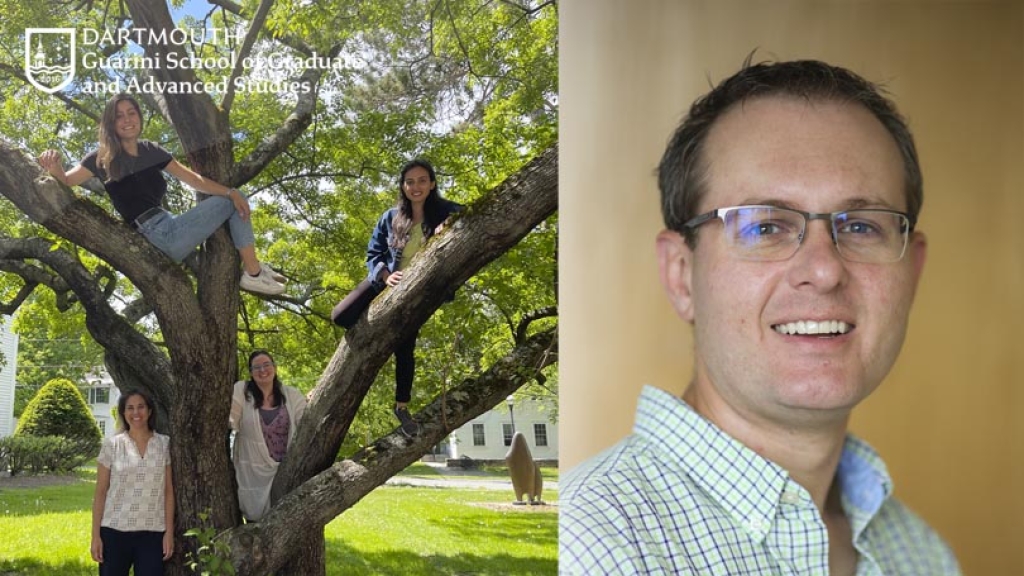The Faculty Mentoring Award is designed by the Graduate Student Council (GSC) to recognize outstanding commitment to fostering the professional and personal development of graduate students.
An effective mentor relationship is multi-faceted and provides supportive guidance to the mentee both professionally and personally. Nomination letters are submitted each year from current and past students in testimony to their mentor's outstanding impact on their development.
The recipients of the 2022 Faculty Mentoring Award are Dr. Todd Miller, Associate Professor of Molecular & Systems Biology and Dr. Katherine Nautiyal, Assistant Professor of Psychological and Brain Sciences Dr. Todd Miller
Todd Miller's approach to mentoring is very much aligned with William Halstead's philosophy common to Surgical training: see one, do one, teach one. "It is also important for the students to see themselves as teachers," he states.
This commitment to developing students' capacity for professional growth also extends to his development of their personal growth. Miller understands the pressures graduate students face and engenders a sense of trust that enable productivity and growth in his mentees' personal and professional lives.
"He is a dynamic mentor who is sensitive to the difficulties not just of grad school, but of life in general and what it means to grow as a young adult and scientist," wrote one of his nominators.
Placing great emphasis on good time management is one of Miller's key strengths. He understands that the Ph.D. experience is a juggling act, and he supports his students in developing effective time management strategies that will lead them to accomplish their goals.
"Being available and having an open-door policy is critical to achieving this," states Miller. This approachability is noted by each of his nominators, every one of whom wrote of their appreciation of how he prioritizes his students in this way.
"This commitment to meeting with students has been vital to me," notes one. Others appreciated his empathetic listening skills as well as his responsiveness to their needs, both qualities of a strong mentor-mentee relationship.
Beginning with an Individual Development Plan (IDP), Miller encourages his mentees to map out a five-year plan that includes research goals, with the understanding that these may shift as the student progresses through their Ph.D.
Noting that each student has individual needs and challenges, and tailoring his approach to each one, is one of the many excellent mentoring strategies Miller employs.
"It is important to recognize that everyone has different needs," Millar states. "And even more important to be available to listen."
In addition to ensuring a healthy approach to time management for his mentees, Miller also goes above and beyond to make sure graduate students feel secure and capable in life outside lab. Citing one example of how he supported a student who was carless, he noted that when his mentees feel supported, they are much more likely to feel effective in their work.
Thank you for all you do, Dr. Miller, and many congratulations on being the recipient of this award.
Dr. Katherine Nautiyal
Letters of recommendation for Nautiyal spoke with enthusiasm and gratitude for her commitment to supporting them through particularly arduous years of the pandemic. In spite of the disruption to normal operations, Nautiyal developed equitable partnerships with her students in the laboratory, ensuring they were managing healthy work-life balances, and feeling supported in their work as much as in their personal lives.
Nautiyal is committed to ensuring her students are pursuing research that is integrated with the work in her lab, while also meeting their individual needs and interests. Her flexibility in her approach was noted by many of those who nominated her for the award.
Supporting her students in maximizing their strengths at the same time as ensuring they receive relevant training to increase their research knowledge is a key factor to the success of her mentoring style.
Every one of her nominators wrote of their appreciation of her efforts in matching students to work that was expanding the scope of their skills in a way that made them feel successful – even when they were being challenged.
Speaking of her past experiences in academia, Nautiyal recalled mentor-mentee relationships where she learned the importance of active relationships, one where "failure is supported, and something that is allowed and turns into a learning opportunity for both parties."
When asked about her mentoring approach, Nautiyal noted a key element in developing a successful model is to take time to sit down with her students and understand their research goals.
"I consider my graduate students as colleagues, in many cases they will know more about the specifics of their work than I will, and I make sure to continue this two-way conversation as we develop the mentoring relationship," Nautiyal stated.
Of particular interest to Nautiual, and a point deeply appreciated by her mentees, is increasing the number of female researchers in the field.
"I truly have great respect and admiration for Kate as an advocate. Kate takes action and pushes for real change," wrote one of her nominators.
Nautiyal was keenly aware of the impact a lack of representation had on her own trajectory. As such, one of her initiatives in the department is to create an environment where her mentees recognize themselves in the people around them, spearheading an initiative to increase the diversity of candidates.
Additionally, Nautiyal makes sure that once the students are here that they feel supported. A large part of her success as a mentor is through holding her students accountable, being flexible, and being available.
However, as she states, "there is no perfect mentor relationship, but the students I have do make mentoring easy."
We are delighted to award the 2022 Faculty Mentoring Award to Dr. Nautiyal -- congratulations and thank you!
